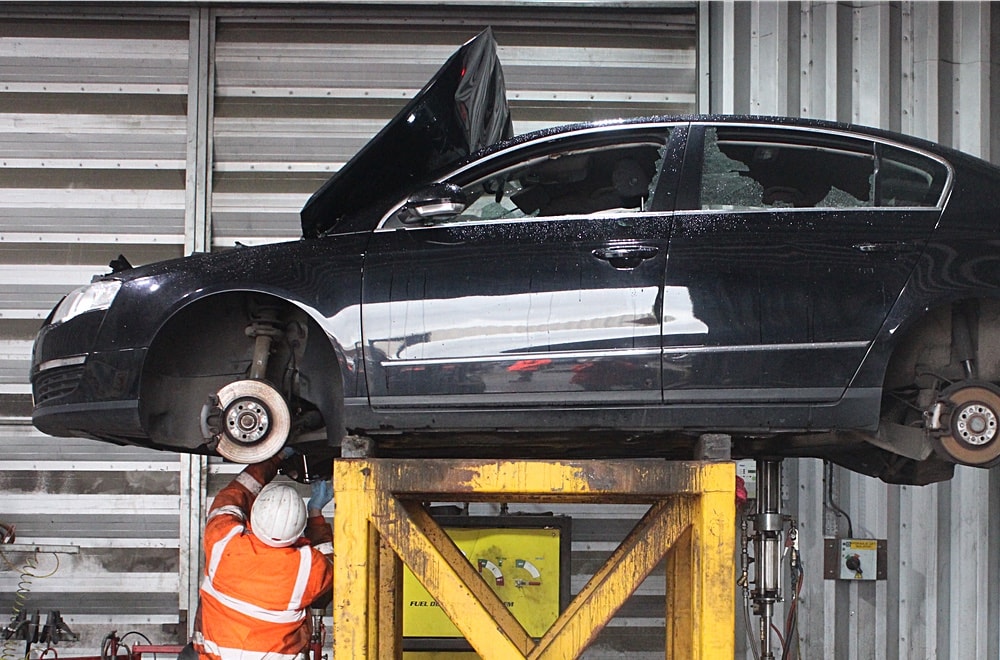CHOOSE
A DIFFERENT TERRITORY

Anyone who has seen videos of gangs jacking up parked cars to remove their catalytic converters knows that this has become one of the biggest issues for drivers and vehicle manufacturers in recent years.
An investigation in 2021 by consumer group Which? found that many victims of this crime have their vehicles written off, with a quarter of drivers seeing their premiums rise following a theft.
At EMR, we engage with police and other partners to play our role in identifying stolen goods and reducing the opportunities for criminals to profit.
Firstly, it’s worth asking: why are these small devices such a magnet for thieves?
“Catalytic converters (CAT’s) are seen on the majority of vehicles we drive today and are there to help remove harmful emissions and pollutants that may otherwise pass through your exhaust,” explains Matthew Cunningham, EMR’s Commercial Manager for End-of-Life Vehicles (ELV) and Catalytic Converters.
“To do this effectively the CAT has to withstand high temperature exhaust fumes as well as control them. Within a CAT, there is a ceramic brick or foil which can withstand these high temperatures. It’s made with a honeycomb structure which is then laced with a coating which includes precious metals. The metals react with the exhaust fumes and help remove the toxic pollutants.”
The precious metals used are part of the platinum group metals (PGM) family and include platinum, palladium and rhodium. They help cut pollution by oxidising the carbon monoxide and hydrocarbons as they are expelled from the engine of a vehicle. Prices of these metals have increased in recent years, due partly to new emissions regulations, which require converters that contain more PGMs, to ensure they are more affective at reducing polluting gases.
Matthew add, “To ensure that we pay the best possible price for every end of life vehicle that we recycle, we use sophisticated systems to estimate the value of the catalytic converter on each vehicle that we receive and we adjust our pricing accordingly.”
EMR sites already use several strategies to reduce the risk of theft. Stock is held in a secure area, accessible only to employees.
EMR barcodes each item, providing an audit trail throughout its processing.
And of course, EMR complies with the 2013 Scrap Metal Dealers Act, which prohibits paying cash for scrap and requires valid identification to for each transaction.
For a longer-term solution to this problem, EMR is also engaging with the police and policymakers. Finding a way to reduce crime while not unfairly affecting the thousands of legitimate businesses which dismantle cars and trade parts isn’t easy, however.
“It has been suggested that recyclers like EMR should request a car’s log book for any catalytic converter we buy, but the law says this must stay with the car,” says Matthew. “There is also no feasible way to guarantee that the catalytic converter belongs to the vehicle and log book.”
Another change, which has been suggested by the Government, is marking every catalytic convertor with a car’s registration number.
“That’s very difficult to do because as a car is built it doesn’t have a registration number,” Matthew explains. “It does have a VIN number, but as a vehicle goes down the line, manufacturers simply attach one catalytic converter of many in the factory. This change would mean all those separate parts would need the same VIN – it would be a huge change for the industry.”
Manufacturers, meanwhile, are already playing a role – redesigning their cars to make thefts harder by repositioning these high-value parts.
As time goes on, Matthew says that as electric vehicles, which don’t use catalytic convertors, continue to grow in popularity the value of PGMs will likely drop below the recent high levels seen and there will be fewer CATs to target.
While the theft of catalytic convertors blights drivers and rewards criminals, EMR is committed to working with all parties to find the right solutions that secure the supply chain and protect our customers.